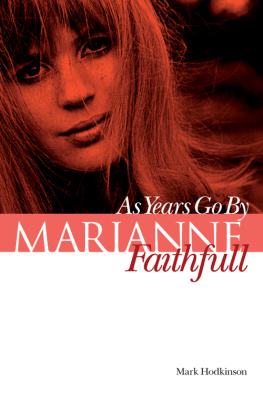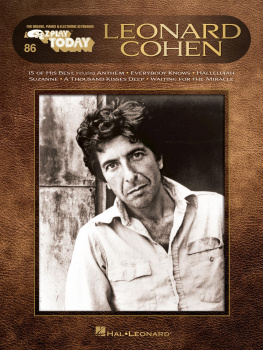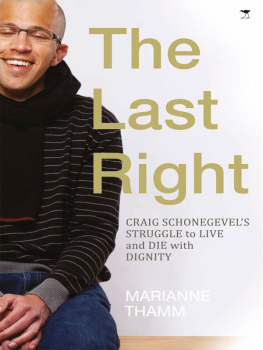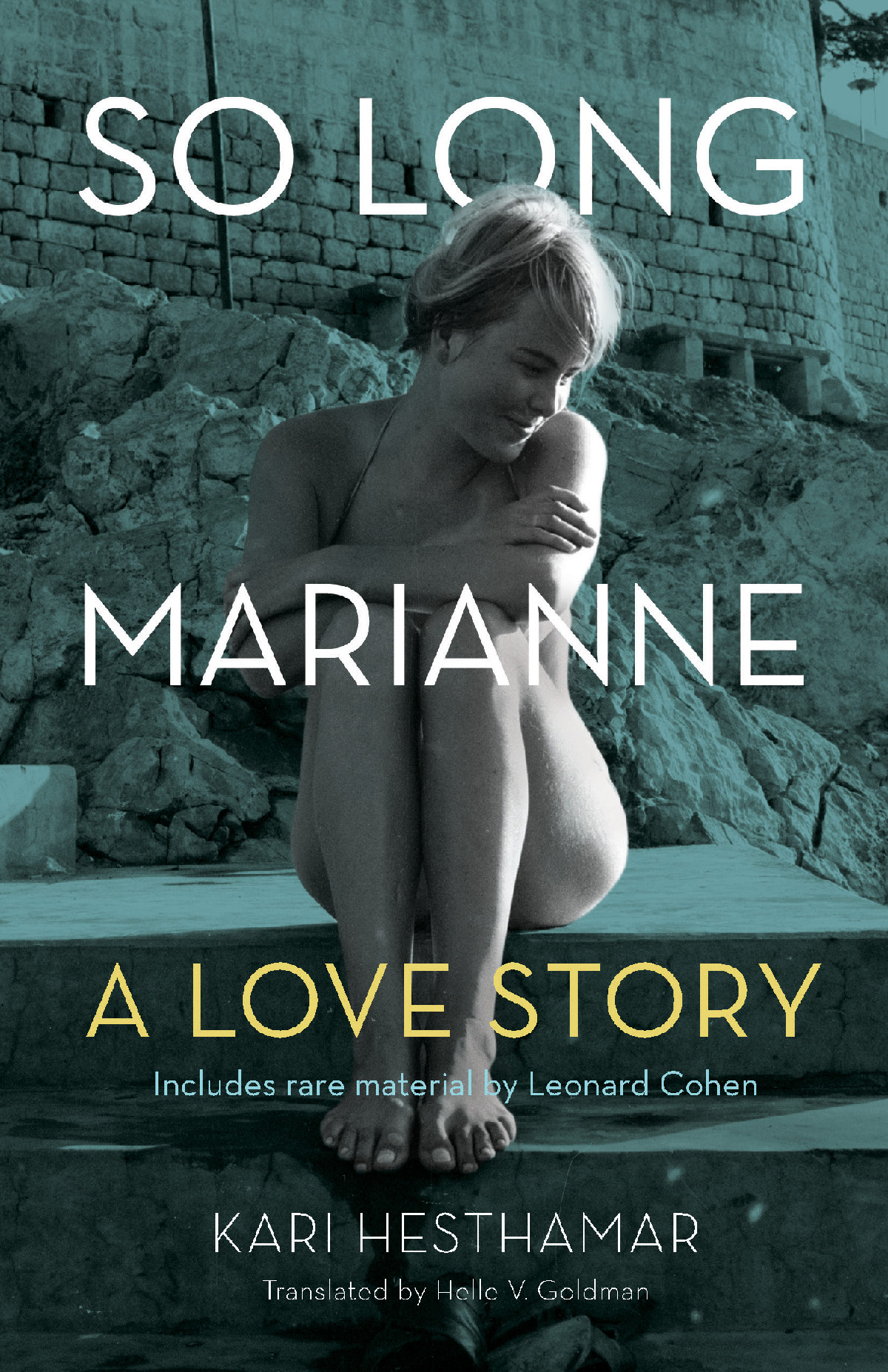SO LONG, MARIANNE
A Love Story
By Kari Hesthamar
Translated by Helle V. Goldman
ECW Press
Come over to the window, my little darling,
Id like to try to read your palm.
I used to think I was some kind of gypsy boy
before I let you take me home.
Now so long, Marianne, its time that we began
to laugh and cry and cry and laugh about it all again.
Well you know that I love to live with you,
but you make me forget so very much.
I forget to pray for the angels
and then the angels forget to pray for us.
Now so long, Marianne, its time that we began
We met when we were almost young
deep in the green lilac park.
You held on to me like I was a crucifix,
as we went kneeling through the dark.
Oh so long, Marianne, its time that we began
Prologue
LEONARD COHEN IS NO THIEF!
I had a very strange dream last night. For the last forty years of my life Ive still been dreaming about Leonard. Even if hes together with someone else, and regardless of the setting, the dreams are positive for me. Last night he made another appearance and he says, Marianne, you must not talk so much. And here I am sitting with you, looking at you, and you get me talking, talking, talking!
That was my first meeting with Marianne. Spring was giving way to summer. She stood waiting for me by a narrow gravel road. This was the beginning of my life, she said, spreading her arms.
We follow a flagstone path through an old kitchen garden the few metres down to the cabinlike wooden house. It is set on Mariannes maternal grandmothers property, just a stones throw from where Marianne spent her childhood.
In the kitchen Marianne offers me warm slippers and Greek coffee. She switches between Norwegian and English when she speaks.
Its strange when your life is linked to someone so well known. A magazine wanted to reunite me and Leonard at Fornebu Airport in the 1970 s, when he was going to have his first concert in Oslo. The idea was to drive me out there in a limousine. The journalist camped out on my mothers doormat for twenty-four hours to get hold of me. I dont go in for that sort of thing. The distance of time has been important. Its easier to talk about these things now than it once was. All the nonsense thats been written about us its just pure fantasy. I havent bothered to say how it really was.
The story I always heard was that Leonard Cohen stole you from Axel Jensen, I say.
But Leonard is no thief! Hes not a thief. Far from it.
Chapter
NINETEEN AND IN LOVE
A newborn girl is laid on the kitchen table in the big wooden house by the fjord. The older woman looks at the child, has longed to hold the girl, lifts her high in the air and exclaims, Youre finally here, my little princess! The year is 1935 and Marianne is at her maternal grandmothers house in Larkollen for the first time.
When the war comes to Norway five years later its safer in the countryside than in Oslo. The old woman has been waiting for her and takes her in as if she were her own. Mariannes mother has more than enough to handle with her little son and an ailing husband. Marianne returns to Larkollen, her childhood ahead of her. Back to the place where she felt she had been seen for the first time.
The older woman feeds the birds, which cautiously alight on her hand to eat. Time ticks by and Momo talks about being inside oneself, about being patient. When Marianne waves her arms in excitement the birds scatter in all directions. The old woman explains to the little girl what it takes to bring the birds to her hand. She says that it takes a long time to become so quiet that you can hear your own inner voice.
Momo tells fantastic stories, bearing away Marianne from their mundane lives on fabulous voyages. The automobile in the garage becomes a horse. Teaching Marianne to ride sidesaddle, her grandmother transports her to the land of princes, where everything has significance.
When Momo was little, she stood on a wooden crate in the back garden in Frogner, a well-heeled neighbourhood in Oslo, and sang for the neighbours. Later, when she began singing lessons, her teacher fell in love with the beautiful young woman. He was thirty years her senior. They were married, and the song was silenced. But still Momo sang for Marianne.
She sees and puts into words the ineffable. I see and I know, says her grandmother. You will meet a man who speaks with a golden tongue.
GENGHIS KHAN
Marianne is now nineteen years old and has just graduated from the Oslo Municipal Trade School. Lying in her room on Professor Dahls Street, she writes in her diary and pines to be far away. When she was younger she read about Genghis Khan whenever she had a free moment. She had daydreamed about the ruthless Mongolian conqueror who ruled a kingdom stretching from the Pacific Ocean to the Black Sea. She imagined him embarking on expeditions, taking along his entire family and Marianne his favoured wife, mother of many children. They thundered off with their horses and cattle, vanquishing new lands and erecting vast tented camps when evening fell. In her reverie, Marianne wore fluttering, brightly coloured garments and sat on horseback by the side of Genghis Khan, more than seven hundred years ago.
She still dreams that a handsome man will come and wrest her out of her ennui. Marianne closes her eyes and yearns. Yearns to be conquered and carried away.
Father would like her to become a doctor or a lawyer, but shes unsure about what to do with her life. Shes studied business and taken a job as a secretary and general dogsbody at an attorneys office. Now, happily, its Saturday night. The sun is still high in the sky, one of those days of late summer that seems as if it will last forever.
Laughter and lively voices issue from an open window. Marianne has been at a girls party on Bygdy Peninsula, an upscale suburb of Oslo, and now one of her friends wants to visit her boyfriend in the city. One of the girls has a drivers licence and has borrowed her fathers car. The town rests sluggishly in the evening light. The laughing girls slowly make their way up Majorstua Street. And there stand four boys whose linked hands block the road. A suntanned boy sticks his head through the car window and looks at Marianne.
Who are you?
My name is Marianne.
You have to come to the party!
And Marianne goes. Of course she does! They go to a party in a large apartment in St. Hanshaugen. Wearing a cardigan and green felt circle skirt she bought when she was an au pair in Newcastle, Marianne has padded her brassiere with cotton batting. The suntanned boys name is Axel and he says that he has just come home from the Sahara. With slanted eyes and high cheekbones, he looks like a Mongol. He is rugged and sexy and blond. Marianne ends up sitting on his lap as he regales her with incredible stories from his journey in the desert. She has never met a man with so much to talk about, someone so entertaining. He talks about Theta and MEST whatever that is and everything is adventures and fables.
After the party breaks up, Marianne walks with light feet through the summer night. In a daze. She hasnt understood most of what was said, but she has been borne away on a journey. She knows that this moment could be the pivot on which her life turns toward an entirely new direction.
The year was 1954 . The Theatre Caf, the Engebret Caf and the Lorry were artists stomping grounds, where the modernists and more traditional artists engaged in heated debates. Literature began to concern itself with social criticism and the post-war consensus that established the modern welfare state of Norway. Axel was twenty-two years old and one of the emerging new voices, expressing ideas and thoughts that were strange to most people.














